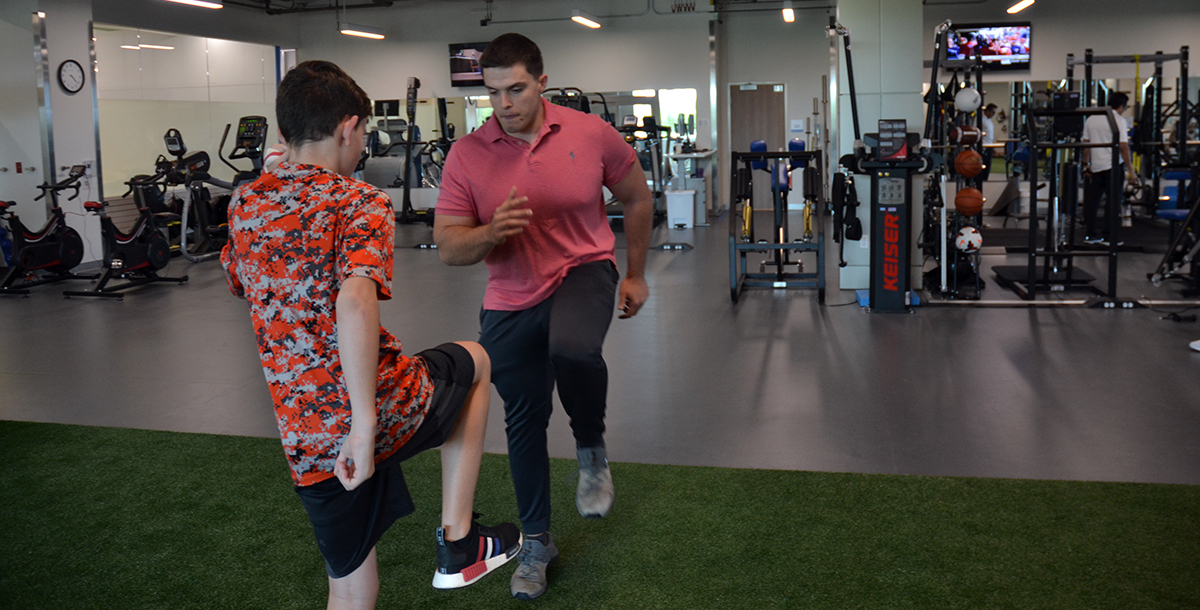
Sep 25, 2019 / Sports Medicine
What is the Role of a Strength & Conditioning Coach in a Young Athlete's Training Plan?
The “fitness” industry is constantly evolving and changing. There are so many options to choose from including: personal training, sports performance training, barbell sports (Olympic weightlifting, bodybuilding, powerlifting), strongman, aerobic exercise (running, cycling, etc.) and high intensity interval training. The choice of which of these activities to participate in can become very stressful without the proper guidance.
Certified Strength and Conditioning Specialists® (CSCS®) are professionals with special training and expertise. Standards set by the National Strength and Conditioning Association (NSCA®) are designed to ensure that these coaches have the proper training and skills to promote safe participation in these activities. As pediatric specialists at Scottish Rite for Children, we believe this is very important because children are less likely to make desired training adaptations and are at an increased risk of injury when performing activities without proper form under the guidance of a coach who is not adequately educated and/or experienced.
To support our rapidly growing sports medicine practice in Frisco, our sports therapy team has grown substantially since we opened. One of our new team members, Ian Wright, P.T., D.P.T., CSCS, USAW, is both a coach and a physical therapist. He shared with us some thoughts on why a certified strength and conditioning coach is an important player on a young athlete’s team.
The start of any coach-client relationship is a conversation about the athlete hopes to achieve in a pre-determined amount of time, aka a goal. These can range from weight-loss goals to performance goals and everything else in-between. The coach creates a road map that is age and training specific while taking into consideration the athlete’s medical and injury history.
Ian brings all of these skills and experience with him to his therapy practice while motivating athletes to become the best version of themselves. Finding the right coach is important. For many young athletes, they have access to a coach in their high school. For others, finding a community-based program is necessary. A little more about Ian’s experience:
Certified Strength and Conditioning Specialists® (CSCS®) are professionals with special training and expertise. Standards set by the National Strength and Conditioning Association (NSCA®) are designed to ensure that these coaches have the proper training and skills to promote safe participation in these activities. As pediatric specialists at Scottish Rite for Children, we believe this is very important because children are less likely to make desired training adaptations and are at an increased risk of injury when performing activities without proper form under the guidance of a coach who is not adequately educated and/or experienced.
To support our rapidly growing sports medicine practice in Frisco, our sports therapy team has grown substantially since we opened. One of our new team members, Ian Wright, P.T., D.P.T., CSCS, USAW, is both a coach and a physical therapist. He shared with us some thoughts on why a certified strength and conditioning coach is an important player on a young athlete’s team.
Setting and Achieving Appropriate Goals
The start of any coach-client relationship is a conversation about the athlete hopes to achieve in a pre-determined amount of time, aka a goal. These can range from weight-loss goals to performance goals and everything else in-between. The coach creates a road map that is age and training specific while taking into consideration the athlete’s medical and injury history.
Holding the Athlete Accountable
Consistency is the cornerstone to which all goals are attained. You can have the best coach in the world who wrote a program tailored to your every need, but if you don’t show up to put the work in, none of it really matters. Showing up is half the battle and a coach will hold you accountable.Ongoing Evaluation of Progress
A coach objective evaluates the athlete’s progress toward their personal goals. The coach combines the client-specific performance measures and programming with the latest research to focus training activities on what matters: attaining their goal! This alleviates the “paralysis by analysis” syndrome caused by information overload which slows done most fitness plans.Challenging the Athlete to Grow
A coach challenges the comfort zone. Individuals adapt in adverse or challenging situations that are not a part of their everyday routine. Hiring a coach positively impacts the physical sense of improved aesthetics or performance, but also the mental perspective. A coach instills character traits of perseverance, responsibility, humility and self-discipline.Inspiring the Best Version of Yourself
It sounds cliché but is true! Life happens to everyone, and usually the first excuse to be uttered out of people’s mouths is a lack of time to devote to exercise or train. Busy schedules, personal life, stress and family are some of the most commonly cited excuses to abandon fitness and/or training goals. A good coach holds their athletes accountable using specific, measurable, attainable and timely goals that are based on findings performed at the initial evaluation.Ian brings all of these skills and experience with him to his therapy practice while motivating athletes to become the best version of themselves. Finding the right coach is important. For many young athletes, they have access to a coach in their high school. For others, finding a community-based program is necessary. A little more about Ian’s experience:
- Olympic weightlifting mentored under Senior International Coach and President of Columbus Weightlifting Mark Cannella
- Doctorate in Physical Therapy from Ohio University in 2018
- Experience training and/or rehabilitating high school to professional level athletes in a variety of organizations including the NHL (Columbus Blue Jackets 2014-2015 season) and NFL (Ravens).
- Current certifications include USA Weightlifting (USAW) Level 1 Coach and Certified Strength and Conditioning Coach (CSCS) certifications



